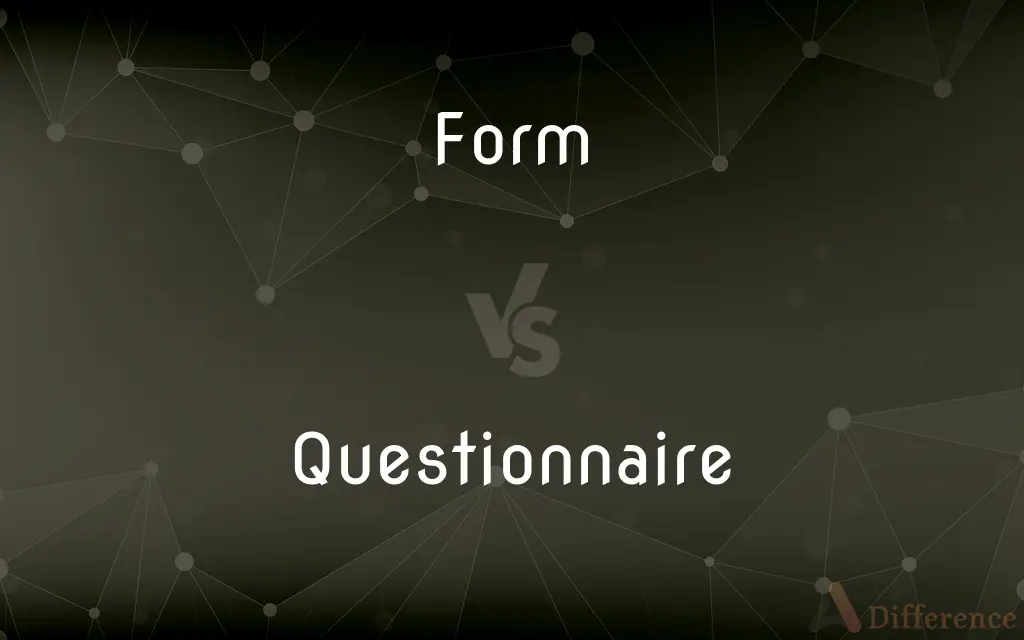Form vs. Questionnaire — What's the Difference?

Difference Between Form and Questionnaire
ADVERTISEMENT
Compare with Definitions
Form
The shape and structure of an object
The form of a snowflake.
Questionnaire
A questionnaire is a research instrument consisting of a series of questions (or other types of prompts) for the purpose of gathering information from respondents. The questionnaire was invented by the Statistical Society of London in 1838.Although questionnaires are often designed for statistical analysis of the responses, this is not always the case.
Form
The body or outward appearance of a person or an animal; figure
In the fog we could see two forms standing on the bridge.
Questionnaire
A form containing a set of questions, especially one addressed to a statistically significant number of subjects as a way of gathering information for a survey.
Form
A model of the human figure or part of it used for displaying clothes.
ADVERTISEMENT
Questionnaire
A form containing a list of questions; a means of gathering information for a survey
Carry out a questionnaire
Fill out a questionnaire
Form
A mold for the setting of concrete.
Questionnaire
To survey using questionnaires
Form
The way in which a thing exists, acts, or manifests itself
An element usually found in the form of a gas.
Questionnaire
Same as Questionary.
Form
(Philosophy) The essential or ideal nature of something, especially as distinguished from its matter or material being.
Questionnaire
A list of questions, usually on a printed form, to be answered by an individual. The forms often have blank spaces in which the answers can be written. Sets of such forms are distributed to groups and the answers used for various purposes, such as to obtain statistical information for social science, political, or marketing research, or to obtain information about a patient for the use of medical practitioners.
Form
A kind, type, or variety
A cat is a form of mammal.
Questionnaire
A form containing a set of questions; submitted to people to gain statistical information
Form
(Botany) A subdivision of a variety usually differing in one trivial characteristic, such as flower color.
Form
Method of arrangement or manner of coordinating elements in verbal or musical composition
Presented my ideas in outline form.
A treatise in the form of a dialogue.
Form
A particular type or example of such arrangement
The essay is a literary form.
Form
Procedure as determined or governed by regulation or custom
Gave his consent solely as a matter of form.
Form
Manners or conduct as governed by etiquette, decorum, or custom
Arriving late to a wedding is considered bad form.
Form
A fixed order of words or procedures, as for use in a ceremony
"As they had never had a funeral aboard a ship, they began rehearsing the forms so as to be ready" (Arthur Conan Doyle).
Form
A document with blanks for the insertion of details or information
Insurance forms.
Form
Performance considered with regard to acknowledged criteria
A musician at the top of her form.
Form
A pattern of behavior or performance
Remained true to form and showed up late.
Form
Fitness, as of an athlete or animal, with regard to health or training
A dog in excellent form.
Form
A racing form.
Form
A grade in a British secondary school or in some American private schools
The sixth form.
Form
A linguistic form.
Form
The external aspect of words with regard to their inflections, pronunciation, or spelling.
Form
Chiefly British A long seat; a bench.
Form
The lair or resting place of a hare.
Form
To give form to; shape
Form clay into figures.
Form
To make or fashion by shaping
Form figures out of clay.
Form
To develop in the mind; conceive
Her reading led her to form a different opinion.
Form
To arrange oneself in
Holding out his arms, the cheerleader formed a T. The acrobats formed a pyramid.
Form
To organize or arrange
The environmentalists formed their own party.
Form
To fashion, train, or develop by instruction, discipline, or precept
Formed the recruits into excellent soldiers.
Form
To come to have; develop or acquire
He formed the habit of walking to work.
Form
To enter into (a relationship)
They formed a friendship.
Form
To constitute or compose, especially out of separate elements
The bones that form the skeleton.
Form
To produce (a tense, for example) by inflection
Form the pluperfect.
Form
To make (a word) by derivation or composition.
Form
To become formed or shaped
Add enough milk so the dough forms easily into balls.
Form
To come into being by taking form; arise
Clouds will form in the afternoon.
Form
To assume a specified form, shape, or pattern
The soldiers formed into a column.
Form
To do with shape.
Form
The shape or visible structure of a thing or person.
Form
A thing that gives shape to other things as in a mold.
Form
Regularity, beauty, or elegance.
Form
(philosophy) The inherent nature of an object; that which the mind itself contributes as the condition of knowing; that in which the essence of a thing consists.
Form
Characteristics not involving atomic components. en
Form
(dated) A long bench with no back.
Form
(fine arts) The boundary line of a material object. In painting, more generally, the human body.
Form
(crystallography) The combination of planes included under a general crystallographic symbol. It is not necessarily a closed solid.
Form
(social) To do with structure or procedure.
Form
An order of doing things, as in religious ritual.
Form
Established method of expression or practice; fixed way of proceeding; conventional or stated scheme; formula.
Form
Constitution; mode of construction, organization, etc.; system.
A republican form of government
Form
Show without substance; empty, outside appearance; vain, trivial, or conventional ceremony; conventionality; formality.
A matter of mere form
Form
(archaic) A class or rank in society.
Form
(UK) A criminal record; loosely, past history (in a given area).
Form
Level of performance.
The team's form has been poor this year.
The orchestra was on top form this evening.
Form
A class or year of school pupils (often preceded by an ordinal number to specify the year, as in sixth form).
Form
A blank document or template to be filled in by the user.
To apply for the position, complete the application form.
Form
A specimen document to be copied or imitated.
Form
(grammar) A grouping of words which maintain grammatical context in different usages; the particular shape or structure of a word or part of speech.
Participial forms;
Verb forms
Form
The den or home of a hare.
Form
A window or dialogue box.
Form
Essentials
Form
(taxonomy) An infraspecific rank.
Form
The type or other matter from which an impression is to be taken, arranged and secured in a chase.
Form
(geometry) A quantic.
Form
A specific way of performing a movement.
Form
(transitive) To assume (a certain shape or visible structure).
When you kids form a straight line I'll hand out the lollies.
Form
(transitive) To give (a shape or visible structure) to a thing or person.
Roll out the dough to form a thin sheet.
Form
(intransitive) To take shape.
When icicles start to form on the eaves you know the roads will be icy.
Form
To put together or bring into being; assemble.
The socialists did not have enough MPs to form a government.
Paul McCartney and John Lennon formed The Beatles in Liverpool in 1960.
Form
To create (a word) by inflection or derivation.
By adding "-ness", you can form a noun from an adjective.
Form
(transitive) To constitute, to compose, to make up.
Teenagers form the bulk of extreme traffic offenders.
Form
To mould or model by instruction or discipline.
Singing in a choir helps to form a child's sociality.
Form
To provide (a hare) with a form.
Form
To treat (plates) to prepare them for introduction into a storage battery, causing one plate to be composed more or less of spongy lead, and the other of lead peroxide. This was formerly done by repeated slow alternations of the charging current, but later the plates or grids were coated or filled, one with a paste of red lead and the other with litharge, introduced into the cell, and formed by a direct charging current.
Form
The shape and structure of anything, as distinguished from the material of which it is composed; particular disposition or arrangement of matter, giving it individuality or distinctive character; configuration; figure; external appearance.
The form of his visage was changed.
And woven close close, both matter, form, and style.
Form
Constitution; mode of construction, organization, etc.; system; as, a republican form of government.
Form
Established method of expression or practice; fixed way of proceeding; conventional or stated scheme; formula; as, a form of prayer.
Those whom form of lawsCondemned to die.
Form
Show without substance; empty, outside appearance; vain, trivial, or conventional ceremony; conventionality; formality; as, a matter of mere form.
Though well we may not pass upon his lifeWithout the form of justice.
Form
Orderly arrangement; shapeliness; also, comeliness; elegance; beauty.
The earth was without form and void.
He hath no form nor comeliness.
Form
A shape; an image; a phantom.
Form
That by which shape is given or determined; mold; pattern; model.
Form
A long seat; a bench; hence, a rank of students in a school; a class; also, a class or rank in society.
Form
The seat or bed of a hare.
As in a form sitteth a weary hare.
Form
The type or other matter from which an impression is to be taken, arranged and secured in a chase.
Form
The boundary line of a material object. In (painting), more generally, the human body.
Form
The particular shape or structure of a word or part of speech; as, participial forms; verbal forms.
Form
The combination of planes included under a general crystallographic symbol. It is not necessarily a closed solid.
Form
That assemblage or disposition of qualities which makes a conception, or that internal constitution which makes an existing thing to be what it is; - called essential or substantial form, and contradistinguished from matter; hence, active or formative nature; law of being or activity; subjectively viewed, an idea; objectively, a law.
Form
Mode of acting or manifestation to the senses, or the intellect; as, water assumes the form of ice or snow. In modern usage, the elements of a conception furnished by the mind's own activity, as contrasted with its object or condition, which is called the matter; subjectively, a mode of apprehension or belief conceived as dependent on the constitution of the mind; objectively, universal and necessary accompaniments or elements of every object known or thought of.
Form
The peculiar characteristics of an organism as a type of others; also, the structure of the parts of an animal or plant.
Form
To give form or shape to; to frame; to construct; to make; to fashion.
God formed man of the dust of the ground.
The thought that labors in my forming brain.
Form
To give a particular shape to; to shape, mold, or fashion into a certain state or condition; to arrange; to adjust; also, to model by instruction and discipline; to mold by influence, etc.; to train.
'T is education forms the common mind.
Thus formed for speed, he challenges the wind.
Form
To go to make up; to act as constituent of; to be the essential or constitutive elements of; to answer for; to make the shape of; - said of that out of which anything is formed or constituted, in whole or in part.
The diplomatic politicians . . . who formed by far the majority.
Form
To derive by grammatical rules, as by adding the proper suffixes and affixes.
Form
To treat (plates) so as to bring them to fit condition for introduction into a storage battery, causing one plate to be composed more or less of spongy lead, and the other of lead peroxide. This was formerly done by repeated slow alternations of the charging current, but now the plates or grids are coated or filled, one with a paste of red lead and the other with litharge, introduced into the cell, and formed by a direct charging current.
Form
To take a form, definite shape, or arrangement; as, the infantry should form in column.
Form
To run to a form, as a hare.
Form
The phonological or orthographic sound or appearance of a word that can be used to describe or identify something;
The inflected forms of a word can be represented by a stem and a list of inflections to be attached
Form
A category of things distinguished by some common characteristic or quality;
Sculpture is a form of art
What kinds of desserts are there?
Form
A perceptual structure;
The composition presents problems for students of musical form
A visual pattern must include not only objects but the spaces between them
Form
Any spatial attributes (especially as defined by outline);
He could barely make out their shapes through the smoke
Form
Alternative names for the body of a human being;
Leonardo studied the human body
He has a strong physique
The spirit is willing but the flesh is weak
Form
The spatial arrangement of something as distinct from its substance;
Geometry is the mathematical science of shape
Form
The visual appearance of something or someone;
The delicate cast of his features
Form
(physical chemistry) a distinct state of matter in a system; matter that is identical in chemical composition and physical state and separated from other material by the phase boundary;
The reaction occurs in the liquid phase of the system
Form
A printed document with spaces in which to write;
He filled out his tax form
Form
(biology) a group of organisms within a species that differ in trivial ways from similar groups;
A new strain of microorganisms
Form
An arrangement of the elements in a composition or discourse;
The essay was in the form of a dialogue
He first sketches the plot in outline form
Form
A particular mode in which something is manifested;
His resentment took the form of extreme hostility
Form
A body of students who are taught together;
Early morning classes are always sleepy
Form
An ability to perform well;
He was at the top of his form
The team was off form last night
Form
A life-size dummy used to display clothes
Form
A mold for setting concrete;
They built elaborate forms for pouring the foundation
Form
To compose or represent:
This wall forms the background of the stage setting
The branches made a roof
This makes a fine introduction
Form
Create (as an entity);
Social groups form everywhere
They formed a company
Form
Develop into a distinctive entity;
Our plans began to take shape
Form
Give a shape or form to;
Shape the dough
Form
Make something, usually for a specific function;
She molded the riceballs carefully
Form cylinders from the dough
Shape a figure
Work the metal into a sword
Form
Establish or impress firmly in the mind;
We imprint our ideas onto our children
Form
Give shape to;
Form the clay into a head
Share Your Discovery

Previous Comparison
Guarantee vs. Pledge
Next Comparison
Interlock vs. Interconnect














































